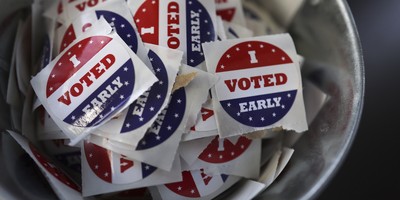What are some principal developments and changes witnessed during a 30-year career in syndication -- indeed, a 46-year career in the newspaper business?
Man on the moon. Giant leaps in technology -- yielding up computers and cell phones of astounding power. Quantum strides in medicine. The collapse of communism and the emergence of Islamofascism -- and, even now, chaos in the Arab world for reasons still unclear. The Pill. Debt of cosmic proportion. The failure of reform after reform to grow educational performance in significant ways. A yawning, and expanding, chasm between our civilian and military worlds.
Across the culture, the cry of diversity -- gender, affectional, and ethnic diversity in education, business, and the military -- witnessed most recently in the pulling and hauling over Don't Ask Don't Tell and the Defense of Marriage Act. The rise of democratic welfarism and the corresponding rise of an entitlement class. Near-paralysis by taxation. Our schools becoming monuments to mediocrity and indiscipline, our colleges licensing the young to do...whatever -- and instructing them less in academics than in sports, forbidden substances, weird behaviors, and sex.
Yet it may be that relating to this column, among the most momentous changes of the past 30 years has been the flight from the printed word.
Small bookshops gave way to megastores, now yielding to online enterprises bolstered by Kindles and iPads. The third edition of the definitive Oxford English Dictionary likely will never appear in printed form, only electronic. Magazines are tanking -- famous flags falling with distressing regularity. Newsweek sold for $1 and accumulated debt; rumors periodically circulate about Time going the way of U.S. News and The Saturday Evening Post (online only).
And newspapers are no exception. The truth is that combined daily circulation has been in decline since the mid-1970s. Industry committee after task force after commission agonized and scratched but couldn't figure out why. Among the major reasons were 1) a decline in appreciation for the joy of reading, 2) the growth of the Internet and the endless expansion of its capabilities, and 3) the inveterate leftism long infusing the mainstream media (MSM).
Recommended
Talk radio and the Internet provided comfortable niches for non-leftists tired of a steady diet of news-side liberalism. Attempts to build leftist talk radio never gained altitude because liberals had little complaint with most major dailies, the networks, and of course, the government-subsidized Corporation for Public Broadcasting.
Unable fully to understand the reasons for the persisting slide in their circulation, newspapers across the land made the near-suicidal decision to give away their content. Implicitly declaring their content to be an information stream to which they attached seemingly no value, newspapers hardly could expect (former) readers to value it sufficiently to start paying for what they used to get for free -- meaning most of those readers were forever lost.
Only last month did the industry's pace-setting New York Times, for instance, begin charging for full electronic access to its content.
The Times and other newspapers have hemorrhaged circulation -- and value. Combined U.S. newspaper advertising revenue has fallen 50 percent since 2005. Numerous dailies are lately bankrupt or gone. The Times-owned Boston Globe, for generations one of the nation's premier newspaper properties, is essentially valueless -- down to near zero from the $1.1 billion The Times paid for it in 1993.
None of this is keyboarded here with any joy, but rather to describe the extent of the plight of the written word. People are finding their information elsewhere, if they're finding it at all. The influence of newspapers, magazines, and network television has plunged. The traditional reading experience, consisting of holding a tangible book, newspaper, or magazine as the eyes move through the printed text -- the imagination taking wing -- may be joining the stegosaurus. The reader is shorted, the citizenry less informed.
The overwhelming leftism of the MSM has been clear since pollsters began analyzing the data. Major MSM players land on the ideological spectrum at about 9-1 liberal-conservative. At the April, 1980 convention of the American Society of Newspaper Editors, I was one of just five among 500 attending editors who wanted Ronald Reagan to become the next president. With the growth of viable alternatives to the MSM, long-distressed readers (and viewers) fled in droves to new, more comfortable, niches -- talk radio, the Internet, and Fox News.
Why the MSM's thoroughgoing leftism? It's a constant question. The basic answer goes like this: The MSM is no different from those other sturdy shapers of opinion -- the entertainment industry, the academy, and mainline churches.
In Hollywood, occasional conservative actors appear (hardly ever an actress): Liberalism is a constant, and liberals hire their own. The academy is the same way. Ditto the mainline denominations, though there the departure of fed-up parishioners from the pews to greener evangelical pastures in a new Great Awakening parallels the departure of newspapers' readers.
This career has seen, crucially, the collapse of stabilizing institutions and flight from the printed word. And here's perhaps the key disconnect: Since 1994, Americans consistently have described themselves to Gallup as twice as conservative (about 40 percent) as liberal (about 20 percent). Yet about 90 percent of the MSM self-describe as liberal. The media/liberal axis, such as it is, still may run what's left of the opinion-shaping show. But as readers, like parishioners, tune out and go elsewhere, the MSM speaks ever more to itself and a diminishing choir.

























Join the conversation as a VIP Member